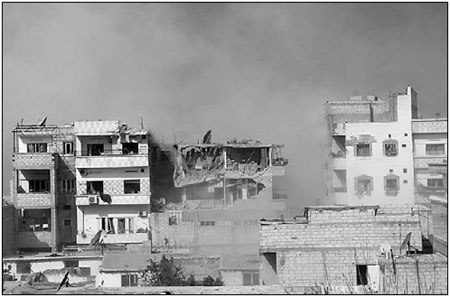US, Russia discuss Syria cease-fires
US Secretary of State John Kerry and Russian counterpart Sergei Lavrov discussed the possibility of cease-fires in parts of Syria, Kerry said on Monday after talks in Paris.
Lavrov said the two also discussed a possible willingness by Syrian President Bashar al-Assad to open aid corridors.
"We talked today about the possibility of trying to encourage a cease-fire. Maybe a localized cease-fire in Aleppo," Kerry told a news conference after talks with Lavrov and UN envoy Lakhdar Brahimi in Paris.
Lavrov, whose government backs Assad, said Damascus had indicated it might provide access for humanitarian aid to besieged areas.
He specifically cited the Damascus suburb of East Ghouta, where 160,000 people have been largely trapped by fighting, according to the United Nations.
"We await similar steps by the opposition," Lavrov said.
The developments came as Assad's forces appear to have made gains on the ground amid deadly internal fighting in the rebellion pitting the once-dominant Islamists against resurgent fighters from groups more palatable to the West.
US Secretary of State Kerry met National Coalition leader Ahmad Jarba, whose grouping includes the main opposition movement in exile, and was due to hold further talks with him on Monday.
"I am confident that he and others will be in Geneva. I am counting on both parties to come together," he said.
Jarba was equally upbeat, saying a "milestone" had been passed in diplomatic efforts to end the conflict, which is believed to have killed at least 130,000 people in nearly three years.
In a statement, the 11-nation Friends of Syria group said that once a transitional government is established "Assad and his close associates with blood on their hands will have no role in Syria".
The so-called "Geneva II" talks due to start on Jan 22 have been organized in an attempt to revive the idea of moving to a transitional government including figures from the current government and the opposition.
Whether that could involve Assad himself is an issue that has generally been fudged in the past and may have the potential to capsize the negotiations: Assad's aides have repeatedly said they have no intention of coming to Switzerland to hand over power.
Concerning the issue of whether Iran, which has been instrumental in supporting Assad, should have any role in peace talks further down the line, Kerry said, "I have said many times, publicly and privately, I would welcome any initiative Iran wishes to take, if they do, to try to provide a resolution to the crisis of Syria," Kerry said.
Iran announced on Sunday through an official television network that its foreign minister, Mohammad Javad Zarif, would travel to Damascus in the next few days.
Jarba has previously called for Assad to stop using heavy weapons, lift sieges on a number of opposition-held areas and allow the opening of humanitarian corridors as a show of good faith ahead of any talks.
Before Monday, there had been no sign of progress on those issues but, with little prospect of securing a military victory in Syria, the opposition has few alternatives to negotiations.
However, the balance of power appears to have tipped in Assad's favor over the last week as deadly clashes have erupted between the mainstream opposition and an al-Qaida-linked group, the Islamic State of Iraq and the Levant, with which they were previously allied.
According to NGOs monitoring the conflict, at least 700 people have been killed since the fighting started Jan 3.
AFP-Reuters
|
Smoke rises after explosions that activists say were caused by barrels dropped from government helicopters in Daria in the Damascus countryside on Sunday. The balance of power appears to have tipped in Syrian President Bashar al-Assad's favor over the last week. Hussam Zeen / Reuters |
(China Daily 01/14/2014 page11)









